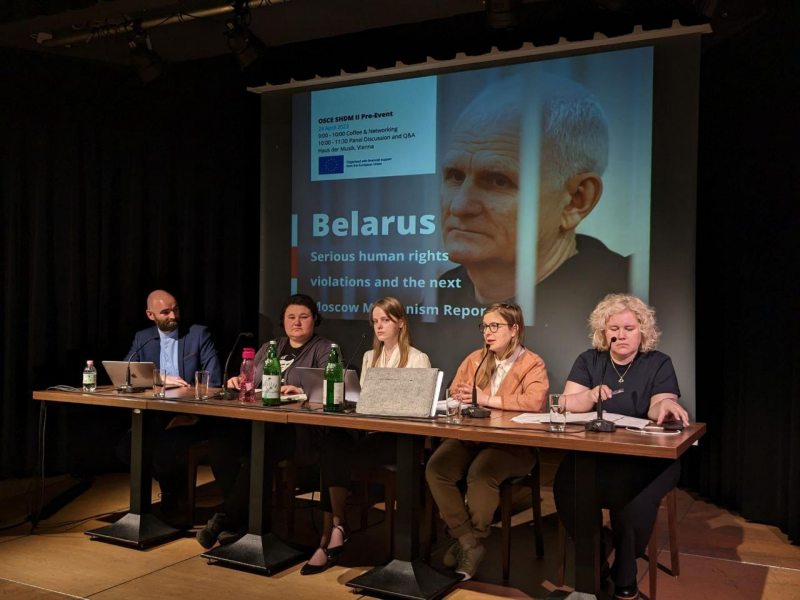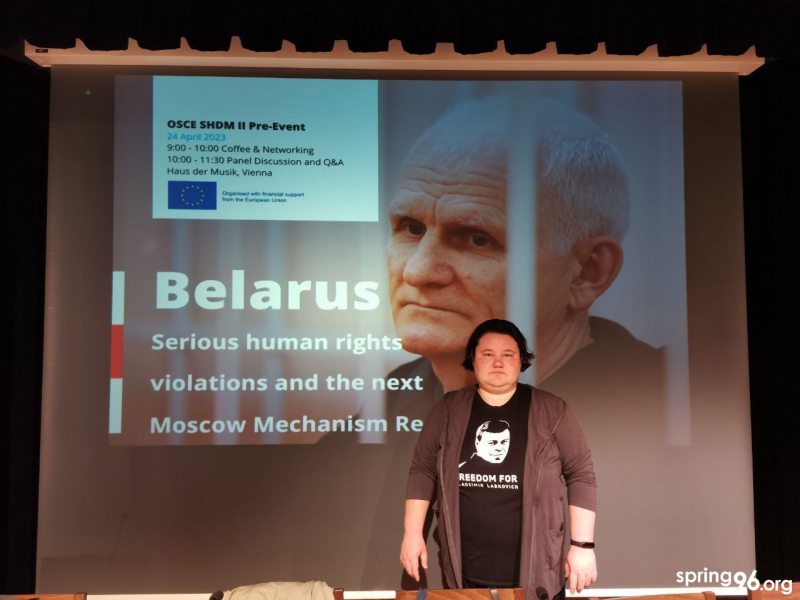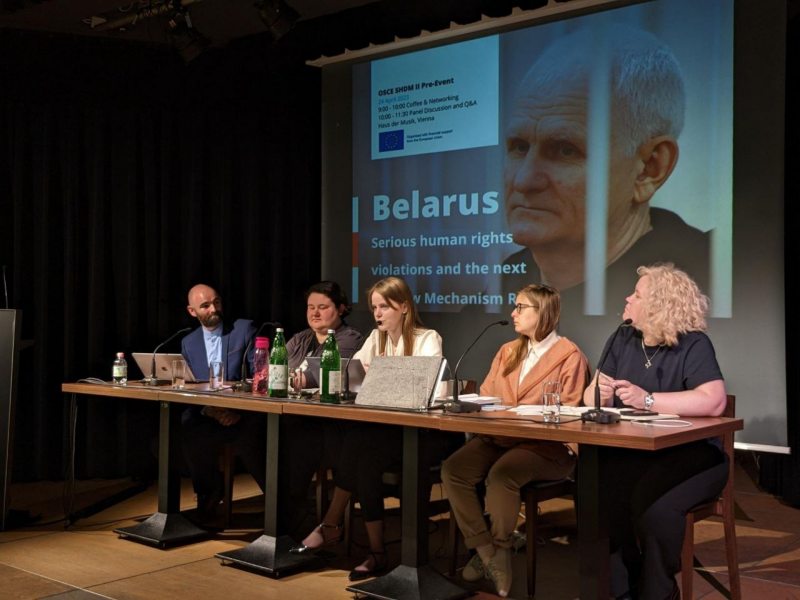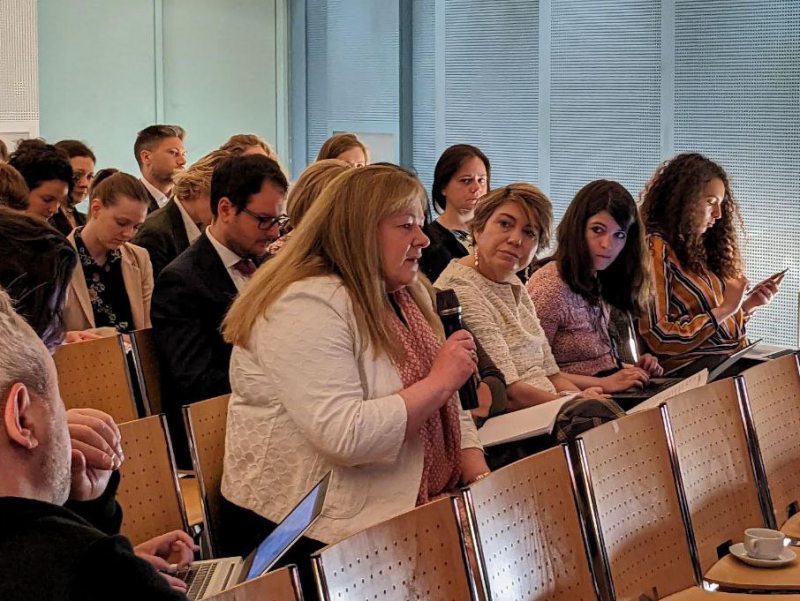"Torture has become commonplace in Belarus." Belarusian HRDs visit OSCE conference
The OSCE conference "Torture and Other Grave Breaches of International Humanitarian Law and Gross Violations of International Human Rights Law: Supplementary Human Dimension Meeting II" housed the event "Belarus. Serious violations of human rights and the next Moscow Mechanism report". Belarusian human rights activists also spoke at the event.
Context
On 23 March 2023, 38 OSCE participating States invoked the OSCE Moscow Mechanism to examine "threats to the fulfillment of the provisions of the human dimension posed by human rights violations and abuses in the Republic of Belarus".
The Moscow Mechanism provides an opportunity for OSCE participating States to send expert missions to help address a specific issue or problem in the OSCE's human dimension. The Moscow Mechanism was last used with respect to Belarus in September 2020, when 17 OSCE participating States resorted to it. The resulting report, among other things, helped pave the way for international accountability mechanisms focused on Belarus, including the UN OHCHR examination mission.
At the OSCE conference that began today, a pre-conference event was dedicated to Belarus.
What did the Belarusian human rights activists have to say?
Natallia Satsunkevich, representing the Viasna Human Rights Center, recalled the anniversary of founding the organization:
"Since 1996, we have been protecting and promoting human rights in Belarus.
Currently, six of my colleagues are in prison in Belarus for this work. They are accused of smuggling money, financing protests, extremism, and other crimes. But the real reason is that they have been vocal about the abuses of the Lukashenka regime.
Last week, the court rejected the appeal of the three Viasna members and upheld their sentences.
In addition to the heavy sentences — 10, 9, and 7 years of imprisonment — Ales Bialiatski, Uladzimir Labkovich, and Valiantsin Stefanovich will have to pay a fine and cover the so-called damages totaling about 450 thousand euros, otherwise, their homes and property will be confiscated.
Valiantsin Stefanovich was one of those who advocated launching the Moscow Mechanism against Belarus in the fall of 2020. Today he can't be here, he is in prison in Belarus, among other things, for this!
I urge you to support human rights defenders — those imprisoned specifically — with letters, information, posts on social media, and statements demanding their immediate release.
Support those who continue to fight for human rights in Belarus: many of us have left Belarus and can't come back because of safety threats and criminal persecution. We really need your support. This includes the living and working conditions of human rights defenders and NGO activists in participating countries.
The human rights activist also raised the issue of torture and inhuman treatment:
"After the presidential elections in August 2020, torture has become commonplace in Belarus.
Virtually every person that is arrested today faces torture and ill-treatment. They're being beaten during arrest and interrogation. They're being held in terrible conditions and subjected to psychological pressure.
In 2022, over 6,000 people will have been subject to some form of arrest and prosecution. That's about 15 people every day, which means that every hour of the day one person is detained. We continue to record violent arrests of those who are merely trying to exercise their rights: freedom of expression, freedom of peaceful assembly, freedom of association, and others.
People in Belarus are severely restricted in their rights. Any attempt to exercise their rights may result in a real term in prison.
On Friday (April 21) the number of political prisoners reached 1,500. 600 more prisoners have been released in the last two and a half years. That is, over 2,000 people have been subjected to politically motivated criminal prosecution!
As if incarceration wasn't enough, prisoners face additional pressures: terrible detention conditions, lack of sunlight, sleep deprivation, impeded access to quality medical care, overcrowded cells, torture by cold and loneliness, and more.
I talk to the families of political prisoners almost every day — and I am confronted with their everlasting grief and fear. For example, the wife of politician Mikalai Statkevich has not received letters or phone calls from him for more than 70 days.
And such cases are abundant, unfortunately."
The representative of the Belarusian Helsinki Committee, Anastasia Dziubanava, recalled that the human rights situation in Belarus has significantly deteriorated over the past two years:
"According to our coalition's report submitted to the Vienna Mechanism a year and a half ago, none of the 72 recommendations made by the Moscow Mechanism Rapporteur to the Belarusian authorities have been implemented. We welcome the re-launch of the OSCE Moscow Mechanism and consider it an important tool for monitoring and following up on the implementation of OSCE human dimension commitments."
The human rights activist drew attention to several amendments introduced into Belarusian legislation to intimidate and punish those who openly and peacefully express their position on the actions of the current government:
"Over the past year, the Belarusian authorities have twice amended the Criminal Code to expand the scope of the death penalty. Whereas previously the death penalty was imposed for special grave crimes, including murder, under the International Covenant on Civil and Political Rights, it can now be applied for 'attempted terrorist attacks' as well as for 'treason committed by a public official or servant'.
In addition, many other legislative changes were adopted to restrict freedom of speech and the media. Criminal liability has been introduced for promoting sanctions, discrediting the armed forces, denying the genocide of the Belarusian people, participating in an extremist formation or supporting extremist activities, and publicly calling for the organization or holding of illegal assemblies. And these are just some of the amendments that create an atmosphere of fear in Belarusian society and lead to an endless number of criminal cases against people who simply wanted freedom, respect for human dignity, and an end to violence."
Therefore, Anastasia Dziubanova noted, it is important not only to express solidarity with the unjustly convicted but also with those inside the country who are in constant fear for their freedom and safety:
"Any action, including a public statement on the inadmissibility of arbitrary changes and the application of the law, a call for the urgent release of political prisoners with serious health problems, the promotion of accountability mechanisms, including universal jurisdiction, or a request to visit places of detention, is important, regardless of the outcome."
The human rights defender also empathized the situation of civil society organizations in Belarus — over the past two years more than 800 organizations have been shut down or are in the process of liquidation, and over 400 have been forced to self-liquidate — as well as the persecution of lawyers — to date, 104 lawyers have been disbarred and 10 are in custody for performing their professional duties. By denouncing the Optional Protocol to the International Covenant on Civil and Political Rights, Belarus withdrew from the individual complaints procedure of the UN Human Rights Committee.
"Victims of human rights violations have thus been deprived of one of the few means of challenging the actions of the authorities before international bodies.
That is why today we are witnessing a widespread crackdown that does not stop for a single day and only brings pain and suffering, first of all to those imprisoned, but also to those who are deprived of seeing their loved ones, of carrying out their professional duties, and simply of staying in their home country. Finally, we suggest that consideration be given to new OSCE monitoring mechanisms of a permanent nature. We would be happy to exchange periodic updates, evaluate recommendations adopted under this Moscow mechanism, or engage in any other form of cooperation. It is very important for us to keep Belarus on the agenda," Anastasia Dziubanava added.
The event was attended by delegations and ambassadors of France, Ireland, and the European Union to the OSCE.
The questions they were interested in were: How do you work in Belarus? How does the situation in Ukraine affect the situation in Belarus? How do the authorities use digital technologies for repression? How to support Belarusian civil society?
The event "Belarus. Serious violations of human rights and the next Moscow Mechanism report" was organized by Viasna Human Rights Center, Belarusian Helsinki Committee, Human Rights House Foundation, Netherlands Helsinki Committee, Ministry of Foreign Affairs of the Netherlands, OMCT, and Austausch e.V. for a European Civil Society.





















